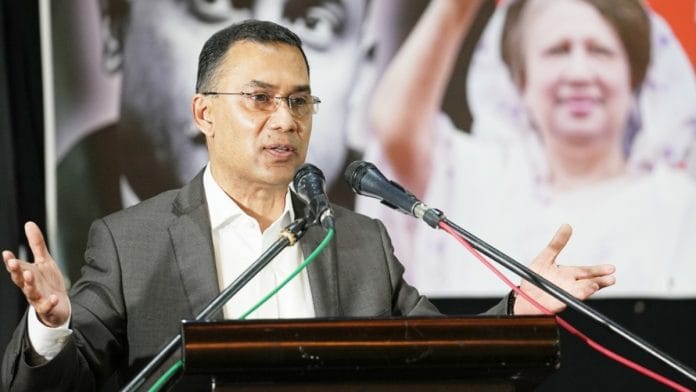When a politician from Bangladesh who lives in self-exile in London addresses a political rally in Dhaka, what he says can only be of limited interest to India. But the slogan that the acting chairman of the Bangladesh Nationalist Party, Tarique Rahman, coined and shared with party workers at Wednesday’s well-attended rally is worthy of New Delhi’s attention.
At the end of his speech, 60-year-old Rahman gave BNP supporters a mantra to take to the people while preparing for elections that he demanded must be held by December. The mantra: “Dilli Noy, Pindi Noy, Noy onno kono desh. Sobar agey Bangladesh.”
In English, the slogan translates to “Not Delhi, not Pindi, not any other country,” ending with a line possibly borrowed from Donald Trump: “It is Bangladesh first.”
Nothing poetic about it—in Bangla, the lines don’t rhyme or qualify as blank verse. But it packs a punch, pithily capturing sentiments that have dominated Bangladeshi politics in the past and fears about the future. In the last 15 years, one of BNP’s key complaints against Sheikh Hasina of the Awami League was her proximity to New Delhi. After Hasina fled the country, the speed of Dhaka’s drift towards Islamabad and Pindi (short for Rawalpindi)—political and military capitals of a nation from which Bangladesh broke away 53 years ago—has been remarkable and disconcerting for many in the country, besides India of course.
Will this mantra win BNP the Bangladesh election? Well, political slogans do come with expiry dates, and what is moot is when elections will eventually be held. Even as Tarique Rahman reiterated the BNP’s December deadline in Dhaka on Wednesday evening, the chief adviser of Bangladesh’s interim government, Prof Muhammad Yunus, stuck to his guns and said in Tokyo—where he is visiting—that elections will definitely not be held in December, but, depending on the pace of electoral reforms, by June 2026.
By then, BNP leader Tarique Rahman’s freshly minted slogan may lose its shine.
Also read: 1971 or 2024? A political battle in Bangladesh over when the nation found true liberation
Chinese whispers
December 2025 and June 2026 is a gap of just six months, and Yunus has repeated his promise of polls by next June ad nauseam. And yet, doubts about him sticking to the deadline continue to be voiced, most loudly by the BNP. Last week, the Bangladesh Army reportedly joined in. Chief of Army Staff General Waker-Uz-Zaman is said to have told officers at a meeting on 21 May that he felt the elections should be held by December.
There was no audio or video recording of this statement or a press release. What went viral, instead, after the meeting ended, were WhatsApp quotes purportedly from his speech. The messages spread so widely that Yunus reportedly told a student leader he was thinking of resigning. The student leader shared this with a major news outlet, and the interim government seemed on the verge of collapse.
The way politics is playing out in Bangladesh these days, Yunus was never on record anywhere threatening to resign and then withdrawing that threat. The Army, on Monday, at least officially denied its chief had said any of the things the WhatsApp messages claimed he did. The net result of this game of Chinese whispers, as it were, was a resignation drama with political parties rushing to placate Yunus.
Among the big players, the Bangladesh Jamaat-e-Islami and the National Citizen Party said they were fine with the June deadline, though a roadmap to elections would be welcome. Unspoken was the subtext that if Yunus wanted to first fully reform the electoral system and then hold elections, that was fine too. But the BNP differed. It said elections first, and whatever reforms remained pending in December would be put in place by an elected government once it came to power.
Hasina vs Yunus
On Wednesday, BNP leader Salahuddin Ahmed reminded the rally that in the past, non-partisan caretaker governments held elections within three months of an elected government completing its tenure. “If this (Yunus) government can’t give us an election in 90 days, it won’t be able to give us an election in 90 years,” he said.
In 2008, a caretaker government held elections that brought Hasina to power for the first time this century. But she abolished the caretaker government provision by amending the Constitution.
Now, she has been using social media to vent, accusing Yunus of “turning Bangladesh into hell.” While that may be an outburst of hyperbole, the uncertainty over what’s next for Bangladesh is taking a toll, pushing the country toward a state of chaos that could rival the turbulence of the Monsoon Revolution.
For the BNP or any other stakeholder banking on elections for a return to normalcy, a long wait seems on the cards. Tarique Rahman, pipped to return from his self-imposed exile in London to lead a BNP sweep of the elections, would perhaps be best advised not to buy his flight ticket yet.
Monideepa Banerjie is a senior journalist based in Kolkata. She tweets @Monideepa62. Views are personal.
(Edited by Prashant)






